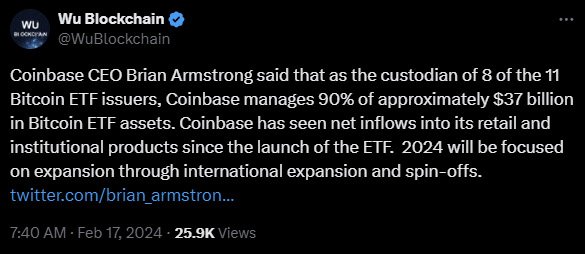Coinbase, a leading digital asset exchange, has emerged as a dominant player in the Bitcoin Exchange-Traded Funds (ETFs) market. Coinbase custody manages a significant portion of the assets held within these funds. With the rise of institutional interest in bitcoin, Coinbase’s role as a custodian for Bitcoin ETFs has garnered attention, raising questions about the concentration of assets within one entity.
Coinbase Custody Leads the Way
In an X post published on February 16th, Coinbase CEO Brian Armstrong highlighted the exchange’s impressive performance in the fourth quarter of 2023. One standout achievement is Coinbase’s custodial services, particularly its management of Bitcoin ETFs’ assets. According to Armstrong, Coinbase currently oversees approximately 90% of the $37 billion worth of assets held within Bitcoin ETFs in the United States.

A Key Player in Institutional Adoption Amid Rising Inflows
Coinbase‘s dominance in Bitcoin ETF custody underscores its pivotal role in facilitating institutional investment in the bitcoin market. As traditional finance increasingly embraces the digital asset, Bitcoin ETFs have emerged as the second-largest commodity ETFs in the U.S., trailing only behind gold. Coinbase’s position as a trusted custodian for these assets positions it as a key player in the ongoing institutional adoption of bitcoin.
The latest reports from Coinbase highlight the significant influx of institutional investments into Bitcoin ETFs. According to data from Farside, with over $4.9 billion invested in existing U.S. spot Bitcoin ETFs so far this year, institutional investors are adapting to the new ETF landscape, providing robust support for Bitcoin’s market dynamics. Coinbase’s custodial solutions play a crucial role in facilitating these institutional inflows, further solidifying its position in the market.
Challenges and Future Outlook
Despite its success, Coinbase’s dominance in Bitcoin ETF custody raises questions about the concentration of assets within one entity. Some observers have raised concerns about the potential risks associated with such concentration. Additionally, the involvement of traditional banking institutions in offering custodial solutions for digital assets poses competition for Coinbase.
Looking ahead to 2024, Coinbase remains focused on expanding its international presence and introducing new derivatives products. The exchange aims to enhance utility in digital assets through payment solutions and the development of its Coinbase Wallet into an on-chain superapp. Furthermore, Coinbase is committed to advocating for regulatory clarity in the digital assets space, ensuring a conducive environment for continued growth and adoption.
Conclusion
Coinbase’s position as a dominant custodian for Bitcoin ETF assets highlights its crucial role in facilitating institutional investment in bitcoin. With its robust custodial solutions and strategic focus on innovation and regulatory compliance, Coinbase is poised to continue driving forward the adoption of bitcoin and contributing to the evolution of the global financial system.
However, challenges remain, particularly regarding the concentration of assets and increasing competition from traditional banking institutions. As Coinbase navigates these challenges, its commitment to providing secure and reliable custodial services remains unwavering, cementing its status as a leader in the digital asset industry.










